Annual ImpactReview 2024

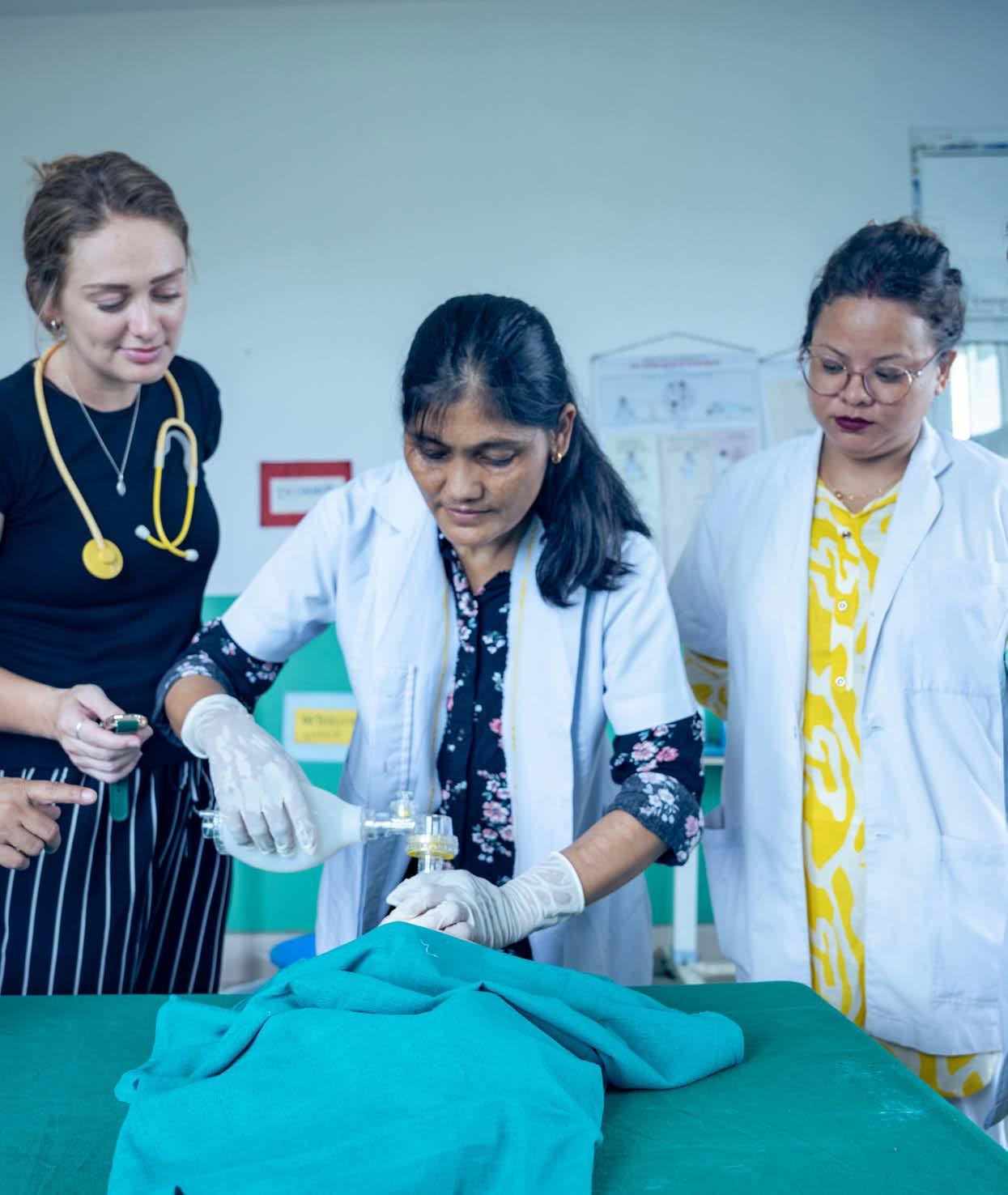



Welcome to our first Annual Impact Review. We’ve designed this review to highlight the exciting impact the College had in 2024. Looking back over the key themes of the last year, it’s remarkable to see all the powerful work that’s happened to engage with our members and to improve child health for the better. The Annual Impact Review recognises the collective efforts of colleagues, clinicians and the children and young people we engage with, and our diverse range of partners both in the UK and internationally.
Ensuring the best in health and care services for children is beset with challenges. From the continuing skills shortages across the professions, to the lack of long-term government plans, policies and strategies, to the wellbeing of the workforce. It’s vital we keep delivering impact as we have done over the last year to continue to advocate on behalf of our members.
We’ve achieved so much, but only through the expertise, tenacity and dedication of our members. To every member, we say thank you.
It’s vital we keep delivering impact as we have done over the last year to continue to advocate on behalf of our members.”
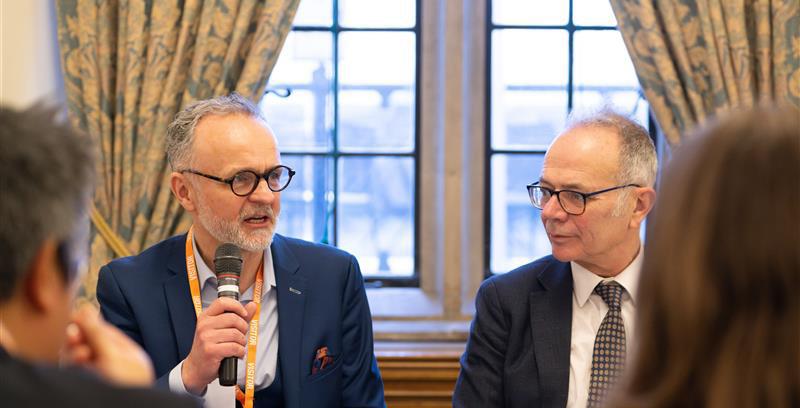
I’m more than a year into my Presidency and I have learnt even more about the College and how it supports our profession in that time.
I know that the College would not be able to do the work it does, or have the impact it has, without the incredible contribution of our members, and in particular our members who give up their time to share their knowledge and insight, lead projects and examine our future paediatricians. I want to say a huge thank you to all of them.
Children’s health in the UK is still not where we want or need it to be. However, I am optimistic about our ability to truly improve children’s health and wellbeing. I’m optimistic because as a collective, and as a community, we are nearly 25,000 members caring for 25% of the UK population. And every day I talk to passionate, dedicated and inspiring paediatricians striving for a better future for our children.

Professor Steve Turner
We achieved a lot in 2024. But this next year is critical, with huge changes ahead in the way health systems are run in England, and elections in Scotland and Wales in 2026 and in Northern Ireland in 2027.
I’m up for the challenge. Because I know that, as the fifth largest medical faculty, we are a powerful voice, and I plan to use that voice to speak up on your behalf, on behalf of our profession and on behalf of children.
As the fifth largest medical faculty, we are a powerful voice, and I plan to use that voice to speak up on your behalf, on behalf of our profession and on behalf of children.”
As CEO of the College, it is heartening and encouraging to read such positive stories of the College’s impact in this review and reflect on the significant achievements made.
We are a four-nation College with international reach working as a force for good. An annual impact review offers a timely occasion to shine a light not just on the numbers demonstrating impact but also on the tangible examples of the difference we are making across our projects and programmes.
The review highlights how we have further developed our workforce and careers advocacy, which is at the heart of the quality and accessibility of paediatric care. We also demonstrate how the College has effectively advocated to improve child health services, moving closer to a smoke and vape-free future. We discuss our campaigning for the UK roll out of the RSV vaccine, along with many other actions to

Rob Okunnu
transform child health. The review also vividly describes our research and quality improvement, education and training, digital engagement, global humanitarian work, and children and young people engagement.
The end of 2024 saw the start of a new strategy for the College. This is a wonderful opportunity to make even more of a difference, and I’m excited about the prospects to grow the College’s impact further. Thank you to our members in College roles, children and young people, and parents and carers who tirelessly dedicate their time to support the work of the College. Thank you also to policy makers, partners, funders and other stakeholders who have worked with us over this period to support paediatrics and child health.
Children and young people need everyone who is involved in the work of the College and the child health sector to protect and promote their rights under the United Nations Convention on the Rights of the Child (UNCRC). By working directly with children and young people, we keep their voice central to our mission.
We asked children, young people and family volunteers to reflect on 2024 and the RCPCH work they supported.
…it is heartening and encouraging to read such positive stories of the College’s impact in this review…”
Mental health and support with neurodivergence are growing issues for children and young people. Barriers to diagnosis and a lack of support mean we can feel misunderstood or excluded. Long waiting lists for GP appointments or initial assessments are leaving us vulnerable.
Behavioural issues at school are blamed on pupils when it’s not their fault. Delays with support also impact on the criminal justice system – an important conversation we must have.
RCPCH makes a real difference, helping improve the health of children and young people by listening and involving us in so much of what they do. Decisions are usually made by older people. But RCPCH &Us is getting children and young people in the room to set the focus and topics from the beginning.
RCPCH champions child-led initiatives like our Podcasters and Youth Editorial Board projects. We’re able to share our thoughts and views in different ways, reach a wider audience and give children and young people autonomy. Opportunities like the National Paediatric Diabetes Audit Communications project and Asthma &Me Ambassadors include children and young people in national conversations.
RCPCH &Us makes sure children and young people’s voices are included where other services forget to or don’t think to.”
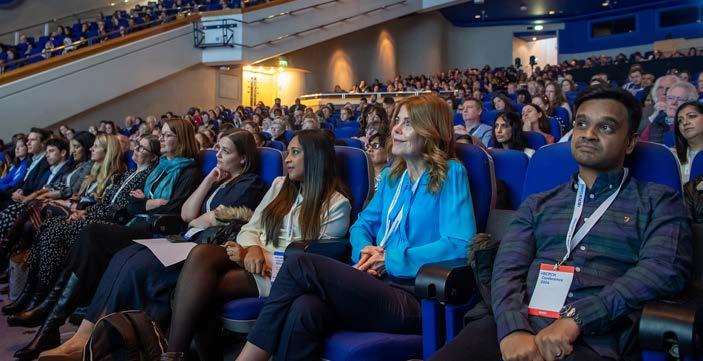
100+ educational courses and digital resources to support professional development on RCPCH Learning
18,000+ active users on RCPCH Learning
35+ live online courses covering everything from clinical expertise to leadership, safeguarding and exam preparation, each delivered by subject-matter experts and tailored to meet the needs of paediatricians at every stage of their careers
40+ recorded webinars
442 doctors in training took START
370+ certifications quality assured for doctors completing their training programme
4.5/5 average rating for education and professional development courses
6,500+ sittings of the MRCPCH theory and clinical exams
13 countries taking clinical MRCPCH exams
25+ on-demand digital resources
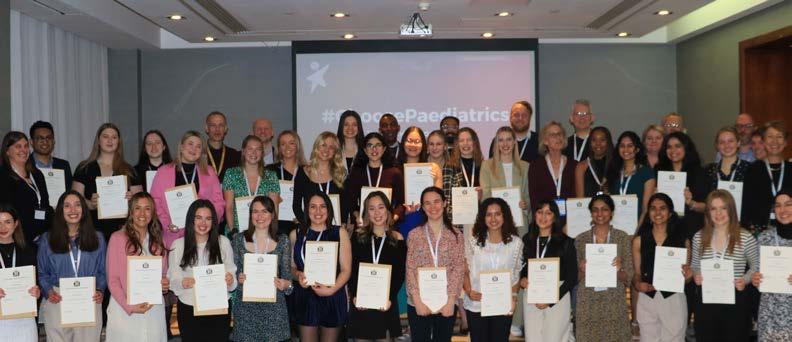
4,300 children and young people involved in College priorities Near 100% fill rate in ST1 and ST3 national paediatrics recruitment rounds
24,000 RCPCH members worldwide 4.4% membership growth 95% retention of members
Popular resources
• MRCPCH exams
• ST1 and ST3 paediatrics
RCPCH Conference
Progress+ curriculum
Manage membership
Growth charts • Child mental health
Health inequalities
Clinical guidelines • Clinical audits
National rota gaps survey report
Revised central national Advisory Appointments Committee programme
Resource hubs on RCPCH Learning for Thrive Paediatrics and Leadership
Rostering guidance for postgraduate doctors in training (England)
Consultant and SAS doctors job planning toolkit
Reviews of paediatric waiting times with policy recommendations in Scotland, Wales and Northern Ireland
And so much more – read on for more details.
A blueprint for transforming child health services in England
As our first ever Annual Impact Review, we’re starting things off with a celebration, highlighting all the achievements RCPCH and our members have accomplished across awards, campaigns, exams, training and development in every area of our work.

We now have 24,000 RCPCH members worldwide, and the number is growing all the time. We’re proud to be the voice of so many experts, professionals and practitioners who dedicate themselves to improving the health and wellbeing of children and young people.
In 2024, we completed work to create our Clinical Audit Platform (CAP), successfully building and launching the new Epilepsy12 data platform within the CAP by the end of the year. Based on the success of this work, we also made significant progress with building the new National Paediatric Diabetes Audit (NPDA) platform on the CAP, with a launch date of April 2025.
Epilepsy12:2023Combinedorganisationalandclinicalaudits:ReportforEnglandandWalesRound4,Cohort5(2021-23)
As part of the England-wide Change NHS programme, we worked with over 2,000 children and young people in Autumn 2024 as part of the biggest ever public conversation on the future of the NHS. Engagement included street outreach, learning and discussion sessions in schools, hospitals and youth provisions, and an online survey. The insight from each activity was analysed, and a formal submission was made on behalf of children and young people by RCPCH &Us. Through their responses, young people told us they wanted a child rights-based approach in the NHS 10 Year Plan process and in health services, alongside children and young people being involved in decision-making, having child and youth-friendly health services and equal access to health services.
As well as clearly making their hopes known for a better health system for children and young people, the work has led to wider discussions with the Department of Health and Social Care and NHS England on how to actively listen and engage with children and young people in service development. Through our work, we found 89% of the children and young people engaged wanted to be involved in supporting NHS service development in the future. 91% wanted health services to be easy to use and accessible, with equal access to good care for all children and young people being seen as important by 95% of participants.
We were thrilled when our collaboration with Digital Health and Care Wales won the “Best Solution for Clinicians” category at the 2024 Health Tech Awards. Clinician coders at the College developed a new API (application programming interface) that can be plugged directly into electronic health records, enabling clinicians in any setting to share growth measurements through a national system. Clinicians in Wales can now access a single, national, validated system for accurate growth recording, simplifying the process of tracking, reviewing and contributing to growth data.
As part of Volunteers Week in June 2024, we celebrated our children, young people and family volunteers with an awards ceremony for RCPCH &Us. It gave us the opportunity to highlight how they have supported each other through education, collaborating, engaging and positively impacting the design and delivery of health services for children and young people.
At the RCPCH Conference we presented our Voice Champion of the Year Award, which is for professionals going over and above in their children and young people's engagement with RCPCH &Us. The award showcases the difference professional volunteers make, and this year it was deservedly won by the Paediatric Diabetes Team in Bradford.
Every year we recognise the very best in paediatric training across the UK. At our 2024 Conference, three amazing members were announced as winners. Mikaela Frixou, Paediatric ST2, Royal Aberdeen Children's Hospital was named Junior Trainee (ST 1–3), Vanessa Sinthuraj, Paediatric ST6 Registrar (Respiratory SPIN trainee), Basildon Hospital, Mid and South Essex NHS Trust was awarded Senior Trainee (ST 4–7) and Dr Leslie Jackson, Consultant Neonatal Medicine, Queen Elizabeth Hospital Glasgow was named in the Educational Supervisor category.
Our 2024 awards include…
Our major fellowships and awards
• RCPCH Honorary Fellowship
• RCPCH Members’ Award
• James Spence Medal
• RCPCH &Us Voice Champion Award
For aspiring paediatricians and training
• Medical student annual prizes
• Tony Jackson Memorial Prize
• Paediatric Awards For Training Achievements (PAFTA)
• Foundation doctor annual prizes
• Examinations awards
Science and research awards
• BPSU Sir Peter Tizard research bursary
• Dr Michael Blacow Memorial Prize
• Donald Paterson Award
• Dr Simon Newell Early Independent Researcher award
• RCPCH-NIHR PIER Award
Fellowships and clinical impact awards
• Visiting Fellowships in global child health
• National Clinical Impact Awards (NCIA) for Paediatrics – Department of Heath and Social Care. Supported by RCPCH.
We’re working at the heart of child health, advocating for all those who dedicate their professional lives to improving outcomes for children and young people. Our rota gaps survey, ‘worried and waiting’ reports and calls for immediate action on vaping, highlight the impact our College has on vital health issues.
Our focus…
Rota gaps
Worried and waiting reports
The new UK government
UK general election and RCPCH &Us
From left behind to leading the way
A smoke and vape-free future
Tackling climate change
Paediatric Early Warning System
Rota gaps have a detrimental impact on the wellbeing, morale and training of resident doctors, ultimately affecting the delivery of patient care. Paediatrics has welcomed the ability for doctors to take Out of Programme Opportunities and train flexibly, the percentage of postgraduate doctors in training Less Than Full Time (LTFT) having increased from 27.6% in 2018 to over 56% now.
Furthermore, following the transition to Progress+, indicative training time has been reduced from eight to seven years with an earlier transition to Tier 2 duties necessitating greater protection for clinical training. Given these changes, the RCPCH Workforce team conducted a survey in 2024 to explore the frequency and duration of Tier 1 and 2 rota gaps in multiple settings and across a range of rota types.

Although just a snapshot of workforce capacity to staff acute rotas, it was a powerful reflection of the state of current resident doctor training and wellbeing in paediatrics. The survey results are in line with the GMC National Training Survey, which showed an increasing percentage of paediatric PGDiT disagreeing/strongly disagreeing that ‘educational/training opportunities are rarely lost due to gaps in rota’ (30.5% in 2024 v 25.8% in 2021) with an increase in self-rated high risk of burnout post-pandemic (16.4% in 2024 v 9.3% in 2019). This worrying trend that ultimately will affect the ability to recruit and retain our paediatric workforce is an essential evidence base, and awareness of the data is the first step to understanding the issues and working towards improving a concerning situation for the paediatric workforce.”
Kay Tyerman, RCPCH Officer for Workforce Planning 2024
Of 204 Trust or Health Boards (THB), 97 (47.5%) provided data for at least one rota – 110 units/hospitals and 153 rotas in total; 13 rotas showed no gaps. Key findings make stark reading:
• Overall rota gaps across England, Scotland and Northern Ireland were consistent at 20–23.5%.
• Across all nations, Tier 2 gaps were higher compared to Tier 1 except Northern Ireland where Tier 1 gaps exceeded those of Tier 2.
• There was regional variation in rota gap frequency with the lowest in Wales, London and East of England and the highest in the Midlands, South East, North East & Yorkshire comparable with that of Scotland and Northern Ireland.
• Combined general paediatric/neonatal rotas experienced the highest rota gaps (23.4%) which were greater for Tier 1 (25%) than Tier 2 (22.1%); all other rota types showed the reverse.

Combined general paediatric/neonatal rotas are most likely in a DGH setting, where the relatively small workforce is more vulnerable to changes.
Rota gap duration was most commonly three to six months with the leading cause being LTFT working (32.4%) and ‘lack of Deanery allocation’ (26%) while use/non – use of locums was evenly split.
Overall rota gaps across England, Scotland and Northern Ireland were consistent at 20-23.5%.
Overall, the available data shows a worrying picture for child health in terms of accessing care.”
Lengthy waits are unacceptable for any patient, but for children and young people the waits can be catastrophic, as many treatments are specific to a particular age or developmental stage. If a child is stuck on a lengthy waiting list, the impact can be disastrous.
That’s why, between March and April 2024, we published reports highlighting the damaging waiting times faced by children and young people across each devolved nation. These waits are a powerful indicator for transformational service reform alongside prioritising child health.
The reports, under the title “Worried and waiting”, provided a brand new analysis of waiting time data. Each report clearly showed the unending pressure on staff to deliver quality services in their area when demand constantly outstripped capacity.
Overall, the available data shows a worrying picture for child health in terms of accessing care, but also for clinician wellbeing in services such as Emergency Departments.
Dr Ray Nethercott, the College’s Officer for Ireland at the time, clearly stated that the current configuration of paediatrics in Northern Ireland is not working, and that the nation has the lowest spend on paediatrics in the UK. Key recommendations from Northern Ireland include developing a whole child approach to service configuration, developing a child health workforce strategy and improving the collection of child health data to enable the Child Health Partnership to identify and bridge data gaps.
In the Worried and waiting report for Scotland, Dr Mairi Stark, RCPCH Scotland Officer, demanded bold measures to improve waiting times and access to healthcare professionals. This was against a backdrop of too many children and young people telling us of excessively long waiting times and experiencing a lack of communication and feeling forgotten.


The picture in Wales made for similar reading: Dr Nick Wilkinson, RCPCH Wales Officer, presented his firsthand experience of the damaging impact long waits for treatment have on children and their families. Demands and pressures on services are unsustainable, and the Wales report highlighted the need to create a workforce that is able to deliver safe and effective care. Based on a comprehensive workforce review, the key recommendations were to improve data collection and analysis to more deeply understand the pressures and demands on the services, tackle health inequities that disproportionately impact on those experiencing higher levels of deprivation. Delivering age-appropriate care for children and young people, ensuring no-one falls between gaps, and everyone is seen by the right health professional for them as soon as they need to is critical.
We needed politicians and policymakers in each nation to help implement our recommendations. We hosted Parliamentary roundtables in each nation throughout winter and spring, which were attended by several MSPs, MSs and MLAs, alongside our own RCPCH members. The reports gained significant media coverage, with multiple media reports and interviews across platforms, and political impact was equally strong.
A range of topical, ministerial and Cabinet Secretary questions were raised in the devolved institutions, and in Wales the report was referenced in a Senedd Equality & Social Justice Committee scrutiny session with the Cabinet Secretary and referenced further throughout 2024.
In March 2024, a motion was submitted to the Scottish Parliament calling on the Scottish Government to implement the report recommendations and commending the College on advocating for reducing paediatric waiting times. In April, the report was discussed at the Scottish Parliament Children and Young People Committee and referenced once again during a child poverty debate in June.
In April 2024, the Minister for Health in Northern Ireland was questioned on how his Department was addressing the findings of the report, and the Northern Ireland Assembly Health Scrutiny Committee added paediatric waiting times as the first of five priorities to scrutinise in 2024/25. Subsequently, RCPCH has been called to give oral evidence in 2025.
To keep up momentum and the call for change, we will be publishing ‘one year on’ reports for each nation. This will extend the important advocacy value of each finding and recommendation, and keep the pressure on politicians to act.
Children, young people and their families were a key part of the impact delivered by the Worried and waiting reports in Wales, Scotland and Northern Ireland. Many young people were involved with outreach and roadshows in each of the nations. They shared how services could help them while they wait for referrals or specialist support by signposting, keeping them updated, providing accurate safety netting information and supporting their anxieties caused by waiting. Several young volunteers took part in our influencing work, joining parliamentary events, sharing their lived experiences, hopes for future services and strong calls for change.
In September 2023 we published our manifesto for the anticipated UK general election and started to engage with the political parties to support children's health in a changing world. The manifesto set our key priorities for the next government.
In early 2024 we met with key decision makers in the Labour party and, noting their desire for health service reform, fed back a range of priority asks which ultimately led to the blueprint outlined below. Furthermore, we are proud that our work supported the key call from Labour to ensure that they engender the 'healthiest generation ever' through a child health action plan.
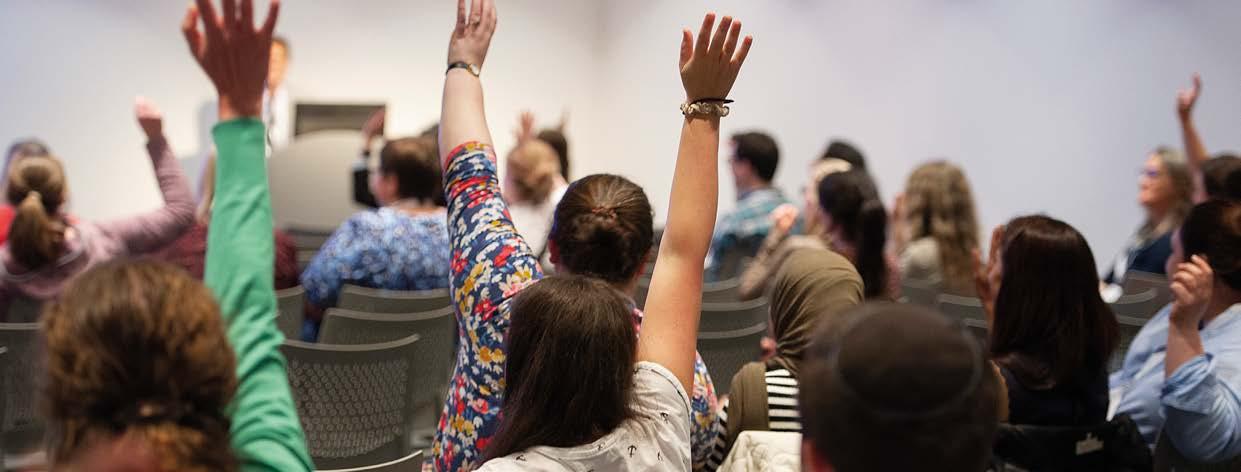
The 2024 general election was a key opportunity to influence the future of children and young people’s health. Led by young people and facilitated by RCPCH &Us, we developed a programme, Our Health Matters. Over 700 11–25 year olds offered their insights, ideas and opinions on what was important to them and how the new UK Government could improve child health.
Over
700
11–25 year olds offered their insights, ideas and opinions
These ideas were shaped into priorities for the government, providing them with a manifesto of intent, and a series of direct asks to ensure child health services and systems were able to give each child the care and treatment they needed, when they needed it.
The programme also created posters and school assembly materials as well as calls for action from government on funding, access to health services, free school meals, support for physical and mental health, tackling health inequalities and supporting all children to have the best start in life.


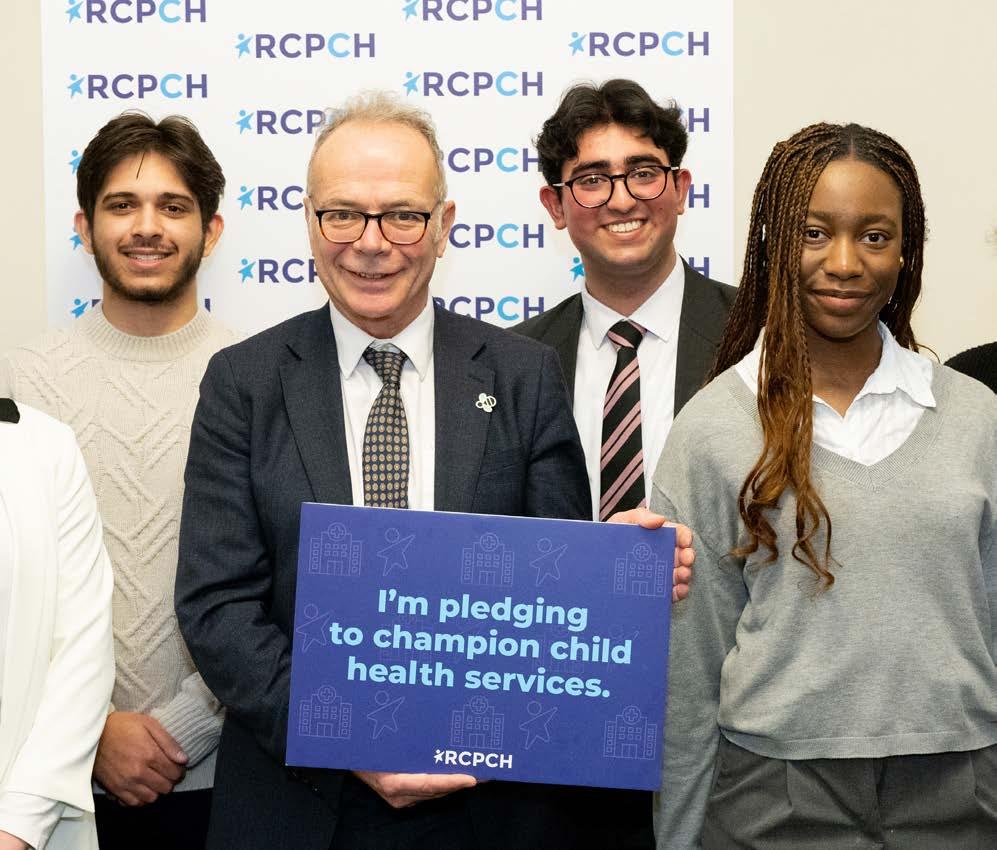
We are publishing our first Annual Impact Review at a time of significant change, challenge and opportunity in the UK. The government has recently announced a new 10 Year Health Plan, providing a timely impetus to give our children’s health a stronger start. Integral to that is the transformation of our child health services and increased support for the child health workforce.
Launched in September 2024, our flagship blueprint for child health services in England set down the stark reality that children and health practitioners were facing and how to build a better future. At the heart of this hard-hitting report is the clearest possible call to elevate child health services, so they are leading the way within a transformed health service. To achieve this, investment is needed in four national foundations to recover children’s health services in England; fair funding, a sustainable workforce, data and digital innovation, and improved integrated care systems.
…investment is needed in four national foundations to recover children’s health services in England.”
75% of
respondents told us children were being negatively affected by long waiting times
74% were seeing children and young people who had waited over 18 weeks for an appointment
For the report’s launch, we surveyed our members on paediatric waiting times. What we found re-enforced the calls within the Blueprint. Seventy five percent of respondents told us children were being negatively affected by long waiting times for treatment. Seventy four percent were seeing children and young people who had waited over 18 weeks for an appointment, with 77% very concerned by these long waits. An overwhelming 83% of members responding said there was not an appropriate level of capacity locally to meet increasing demand.
Post-launch, the report had an immediate impact. Notably, Lord Darzi outlined through his evidence-led review the significant challenges facing child health services and the current state of children's health and wellbeing. Our evidence was central to these conclusions and it was positive to see it reflected there. Following this, in October 2024, the UK government launched a major public engagement initiative to help shape the NHS 10 Year Plan in England. Throughout the autumn we prepared to respond to the call to engagement on the plan and will continue to do so in 2025. The Blueprint opened several doors at the Department of Health and Social Care and NHS England, as our policy and public affairs teams took forward conversations on behalf of our members to ensure our recommendations were front and centre of the minds of decision makers as well as key partners across the health.
Our conversations have made a difference. In the first three months of 2025, we have secured government commitments including:
• That elective care must be delivered equitably and inclusively for all adults, children, and young people
• That Integrated Care Boards (ICBs) plans should reflect the needs of all age groups, including children and young people
• Publication of explicit guidance on neighbourhood multidisciplinary teams for children and young people, with use of the Connecting Care for Children model as a key exemplar framework.
While these commitments are just the start, there is no doubt they represent a significant shift in thinking at the highest levels of decision-making in government. They will begin to set a stronger foundation for our child health services and ensure children and young people receive the equity of investment they deserve in comparison to adults.
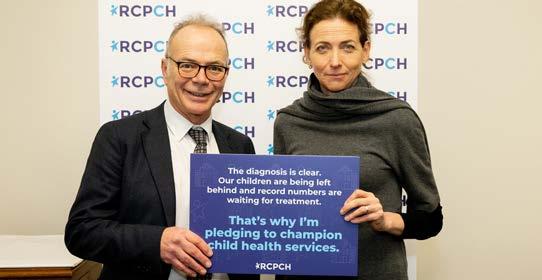
Smoking and vaping are life-threatening for everyone exposed to them. For years, we have been on the forefront of calling for firm, evidence-based action to ensure these toxic products are kept away from children and young people. In 2024 we kept the pressure on decision makers to keep action on smoking and vaping at the centre of the national agenda, campaigning for change and giving children, young people and child health professionals a strong voice to stand up to this pernicious industry.
In August 2024, we responded to new data from Action on Smoking Health (ASH) that showed 18% of 11–17-year-olds had tried vaping, 72% had been exposed to vape advertising and promotion and 48% had purchased vapes from shops. These facts are despite it being illegal to sell vapes to under 18s. RCPCH Vice President for Policy, Dr Mike McKean called on the government to protect children and young people by regulating both products and companies, implementing a ban on disposable e-cigarettes, limiting flavours, introducing plain packaging and restricting online and in-store advertisements.
And on 24 October 2024, we celebrated a huge landmark win as the government announced a ban on disposable vapes from 1 June 2025 in England, with plans for similar bans across the nations. This is fundamental in protecting children and young people, with a quarter of 11–15-yearolds reporting using a vape last year, and the most frequently used device being a disposable vape at 69%.
We are immensely proud to have been integral to this progress. Since our position statement was published in 2023, in which we highlighted the disproportionate use of vapes among young people, we have been constantly active, advocating on behalf of our members
on the need for action to tackle this issue.
We have also highlighted the environmental damage caused by disposable vapes, with over five million thrown away every week.
But the legal ban on disposable vapes is just the beginning. We cannot lessen the pressure on the government in the least.
In December 2024, we brought together organisations representing over 850,000 health professionals in the UK and called on the government to ensure the Tobacco and Vapes Bill, which has now been laid, progressed through the Westminster Parliament at pace.
We will never stop the pressure on the government until our children and young people are free from the danger of smoking and vaping.
…on 24 October 2024, we celebrated a huge landmark win as the government announced a ban on disposable vapes from 1 June 2025 in England.” 18% of 11–17-year-olds had tried vaping
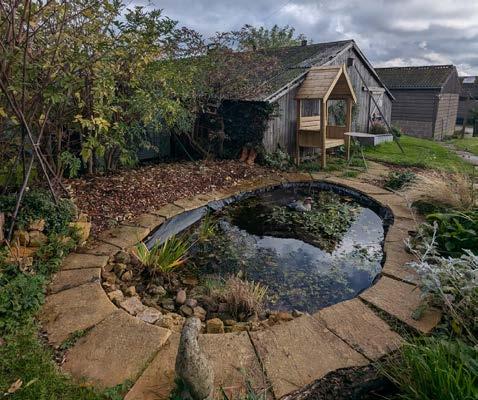
Since 2020 we’ve been advocating for more action in answering the climate emergency. This has included supporting a member-led three-year climate change programme and working strategically with 80 members to deliver a far-reaching climate change plan.
We’re excited and proud that, over the last two years, RCPCH developed a new partnership after securing significant funding from global philanthropic influencer, the Clean Air Fund to focus particularly on the effects of air pollution. Not only is this a tangible issue that paediatricians can get behind, it is also the second biggest risk factor for death globally – making it a public health crisis.
The project has been funded for the last two years and enabled us to achieve significant impact in advocating for the importance of clean air to protect children, who are particularly vulnerable to the health harms of air pollution. We’ve been thrilled to have three College members working with us as clinical fellows to develop our novel Air Pollution Companion – a one-stop shop to learn about air pollution in relation to child health. Alongside resources to support local advocacy, we've developed a host of educational materials to support child health professionals with building their skills and knowledge, including simulation videos to support improved communication with patients and families.
Excitingly, in recent months we've secured additional funding from the Clean Air Fund to support an expansion in RCPCH Global's work. We’re now working with paediatric sister agencies in South Africa, Nigeria and Nepal to document air pollution impact on maternal-foetal, newborn and child health, and develop advocacy strategies for local-toglobal engagement. This global work builds on existing collaboration between RCPCH

and the Clean Air Fund, which centres on the paediatric workforce developing a better understanding and action on air pollution domestically in the UK. We look forward to updating you with progress from our climate work over the next 12 months, as we keep striving to build a better future for all children, wherever they live.
Over the last year, nearly 1,000 children and young people have also taken part in our Climate Changers project, as part of the College’s Clean Air programme. Their input has directly helped develop tools for paediatricians to engage with children and young people about the air they breathe and its connection with their health.
Throughout the project, we’ve heard consistent calls from those involved. 81% of children and young people thought clean air should be a human right. 82% felt there was a connection between air pollution and health problems. 77% said it was important for children and young people’s views on improving air quality to be listened to by people in power.
The project was brought to life for the group with a trip to an innovative permaculture site in Northampton in October, where they had practical activities and time to learn more about the relationship between humans and their physical environment. The day included experiencing life in an authentic Mongolian yurt and creating resources for other children, young people, families and paediatricians.
Following the successful launch and implementation of the Paediatric Early Warning System (PEWS), we have been working closely with NHS Trusts and other partners to make sure the benefits of the tool are felt as widely and deeply as possible. The aim of the new national PEWS tool is to have better health outcomes, ensuring that deterioration in children and young people are escalated and responded to effectively and quickly.
PEWS works by creating a ‘common language’. It’s part of the system-wide Paediatric Observations Tracking (SPOT) programme, led by NHS England and in collaboration from the RCPCH and the Royal College of Nursing, which is developing standardised tools and online learning for using national PEWS charts in a range of health settings.
Since its launch in November 2023, over 50% (73/138) of Trusts in England are using the inpatient nPEWS, and a team at GOSH (Great Ormond Street Hospital) has provided external validation by comparing
its previously validated PEWS tool with the new national PEWS, using a large data set of approximately two million observations.
As PEWS continues to be taken up by even more teams, the impact will increase. We’ll keep advocating for more alignment between the separate national PEWS in the UK and Martha’s Rule, helping support all paediatricians and wider child health teams to notice and identify deterioration in children in health care settings. We’re sure, through continued training and resources, PEWS will become a core tool in improving patient safety, efficacy and quality of care.


The College helps ensure there is an appropriately trained paediatric medical workforce to deliver safe and sustainable services for children in the UK. Our advocacy for the child health workforce is at the heart of the quality and accessibility of paediatric care.
In 2024, we’ve worked to continue to develop workforce and careers activity. We’ve published guidance on consultant and SAS doctor job planning and rostering guidance for postgraduate doctors in training, and tracked national data for our paediatric workforce information and evidence library, feeding directly into our strategic goals. Some further highlights include our focus on rota gaps to the “Worried and waiting” data analysis for each devolved nation, to evidence library data tracking, consultant/SAS job planning toolkit, SAS awareness, rostering guidance for postgraduate doctors in training, and our NHS Long Term Workforce Plan influencing.
This year, our engagement with members, decision makers, children and young people has pushed forward advances in child health. From our campaign for a national RSV vaccination programme, to the roll out of advanced digital growth charts, and work with international partners, RCPCH continues to make a real, global difference.

300+ speakers at our annual conference
Each winter, when the health service is already at capacity, there is an annual peak of respiratory syncytial virus (RSV). It’s a common condition, but in some infants and children, it can be serious: each year, there are 33,000 NHS hospitalisations of under-fives and 20–30 young children die. It’s clear RSV poses a significant threat to children and a huge challenge for child health services each winter.
Campaigning for an RSV vaccine has been a key issue for the College for many years, and we know what a crucial role that vaccines play in protecting child health. That’s why, in June 2024, we celebrated the announcement of a game-changing vaccination programme for older adults and during pregnancy for infant protection across the UK to be rolled out in Scotland in August, and in Wales, England and Northern Ireland in September.
Following advice from the Joint Committee on Vaccination and Immunisation (JCVI) in June 2023 for the government to begin vaccinating, the College put together a headline campaign calling for action. In March 2024, over 2,000 paediatricians and healthcare professionals from across the UK signed an open letter calling on the UK Government to act on the JCVI advice as soon as possible.

20–30 young people die of RSV each year
Addressed to the Chancellor of the Exchequer and Secretary of State for Health and Social Care, the letter called for the UK Government to implement a full RSV immunisation programme for both infants and adults, and to ensure funding is available for the governments of Scotland, Wales and Northern Ireland to introduce full immunisation programmes.
The letter made national headlines in The Independent and Daily Mail and over 200 regional and local publications. Our work was welcomed by stakeholders for leading the way, with MPs and Peers supporting our campaign in the Commons and Lords. Following the vaccine roll-out, we continue to work with stakeholders to encourage uptake and remove access barriers in order to support child health and reduce pressure on child health services during the winter months.

We were thrilled to welcome over
young people and family members at Conference
2024 was another 12 months of high impact RCPCH events. Events are an opportunity to engage with members, children and young people and their families and carers, clinical and healthcare professionals, decision makers and politicians from around the UK. From celebrating the progress our members make, to ensuring we’re listening to all our stakeholders, the impact of getting together in the name of better health for children is central to our work.
Our annual RCPCH Conference took place in March 2024 at the ICC in Birmingham. The flagship event attracted 1,954 delegates representing 41 countries worldwide, with over 350 participating virtually. The programme featured more than 300 speakers, including high profile keynotes, workshop and sub-specialty speakers and abstract presentations.
We were thrilled to welcome over 25 children, young people and family members at Conference, where they presented a powerful child rights presentation at the opening plenary and supported various workshops with presentations about climate change and health inequalities. They helped us bring the conference to a close with a unique take on a game show, covering topics that matter to children and young people, such as mental health and building a brighter future together. The impact that RCPCH &Us has on volunteers was also showcased through plenary videos, with posters available on engagement activity and the chance to meet children, young people and family members at the stand.

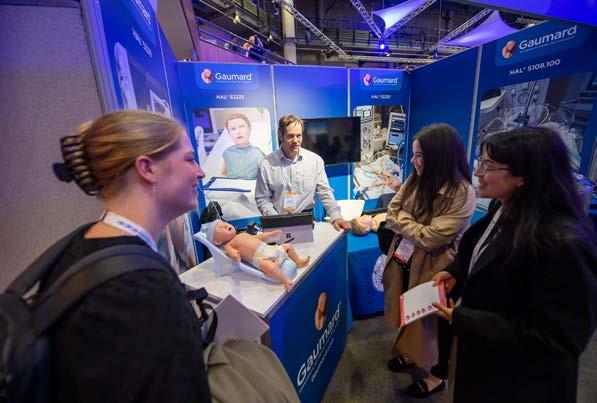
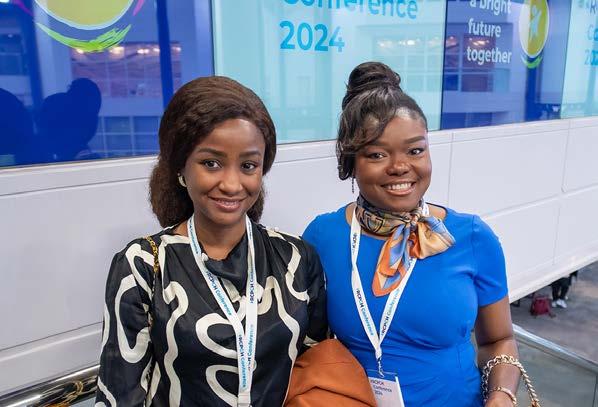
A selection of the sessions were livestreamed and available on demand for attendees to watch live or at a later date. Post-event feedback was overwhelmingly positive, with the quality of the programme and the opportunities to network and engage with the wider paediatric community being popular highlights. We look forward to sharing the impact of Conference 2025 in next year’s report.
Other events included the St David's Day Conference in March 2024, bringing together over 90 delegates. This event gave paediatricians and child health professionals based in Wales the opportunity to build their skills, share knowledge and identify ways to push for meaningful change in health policy.
Our Research and Evidence team hosted a CPD-approved study day covering the fundamentals of genomics in paediatrics. Delivered in partnership with NHS England’s Genomics Education Programme, the talks and workshops included an introduction to the fundamentals of genomic medicine, the practicalities of testing, genomics education and a look to the future.
We ran several research and quality improvement related events to enhance members’ research skills and build research capacity and capabilities. These included our RCPCH-NIHR (National Institute for Health and Care Research) Academic Trainees’ Day in October 2024, ‘From curiosity to discovery: research essentials for paediatricians in training’ in December and a webinar on leadership, featuring leading quality improvement and patient safety.
We regularly host admission ceremonies in venues across the UK, and in 2024, 639 members and their families joined to celebrate their admission as Ordinary Members or Fellows. In November 2024, we also held a Senior Members event in Oxford and the Scottish Child Protection Study Day in Stirling.
639 members and their families celebrated their admission
RCPCH Global’s Rwanda Perinatal Improvement Programme (RPIP), in partnership with the Rwanda Paediatric Association and the Rwandan Ministry of Health reported continuing and sustained reductions in neonatal deaths.
We worked with partners including The United Nations Relief and Works Agency for Palestine Refugees in the Near East and Medical Aid for Palestinians to adapt and pilot new early child development screening tools, with the potential for adoption across significant areas experiencing humanitarian crises in the Middle East region.
We demonstrated the power of philanthropy through a generous legacy from members, designated to support the health of Palestinian children. The legacy has allowed us to continue and build on our humanitarian commitment to support the health and welfare of children wherever need arises, such as to continue support to clinicians and colleagues in Myanmar heavily impacted by natural disaster and conflict.
We demonstrated the power of philanthropy through a generous legacy from members, designated to support the health of Palestinian children.”

Throughout 2024, RCPCH Global worked with Obafemi Awolowo University Teaching Hospital and Osun State Ministry of Health in Nigeria. Together, we introduced developmental screening at primary care centres and established a new multidisciplinary neurodevelopmental diagnosis and therapeutic centre in Osun State in South West Nigeria.
This work builds on our engagement with paediatric partners, child health practitioners and local partners in Nigeria, as well as with diaspora Nigerian paediatric clinicians in the UK. The current programme is the result of those engagements, and will, we hope, form the basis for further development in future.
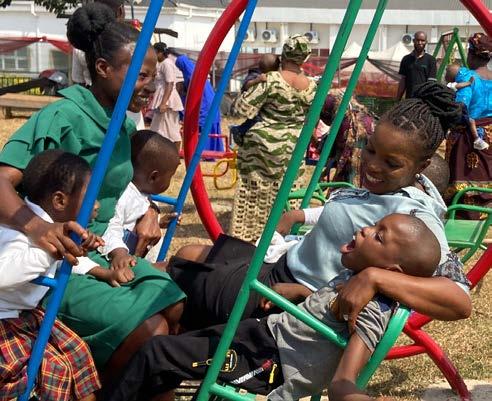
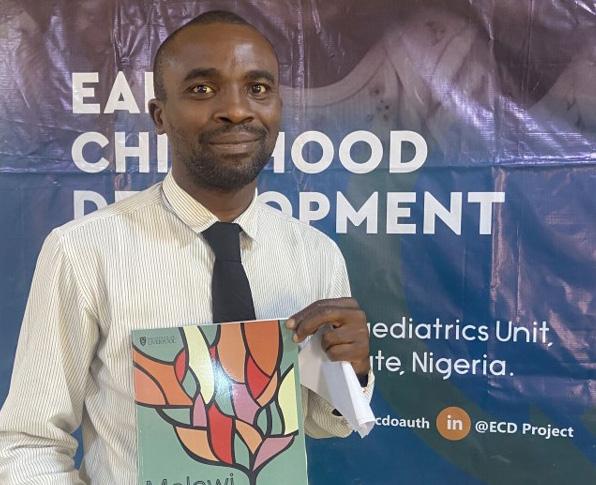
Over the last five years we have been developing digital growth charts in-house to support the NHS with children’s growth and weight assessment.
Used on a daily basis, these charts are now being used by eight English NHS Trusts, and have been rolled out across the whole of NHS Wales. This has not only supported the healthcare of up to half a million children in 2024 but also generated income for the College which will be used to keep improving and developing our digital services. This year, we added international growth standards from the World Health Organisation and United States, already being used by a partner organisation, SigmaMD, to deliver our growth charting capability to frontline doctors across the USA.
We invited members to complete two surveys to better understand their needs relating to digital paediatric skills and to identify effective digital solutions in child health. We’re turning this insight into direct impact, creating prototypes for our digital paediatric skills roadmaps and a digital paediatric solutions catalogue for testing which will lead to the full publication of these ongoing services to members.
Our Digital team also delivered the RCPCH Community Platform to NIHR, who are planning to use it to connect their stakeholders and drive paediatric innovation across the UK.
Through our national clinical audit work, led by the RCPCH Audits Team, the College focuses on improving care processes and outcomes for babies, children and young people and their parents/carers and families and on supporting the clinical teams who care for them.
Commissioned by the Healthcare Quality Improvement Partnership (HQIP), as part of the wider National Clinical Audit and Patient Outcomes Programme (NCAPOP). These national audits cover diabetes, epilepsy and neonatal care, some of the most common conditions and issues impacting on children’s health.
In 2024, we published several reports as part of the HQIP commissioned national audits. These included:
• National Clinical Audit of Seizures and Epilepsies for Children and Young People (Epilepsy12) 2024 combined organisational and clinical audits State of the Nation report
• National Neonatal Audit Programme (NNAP) State of the Nation Summary report on 2023 data
• National Paediatric Diabetes Audit (NPDA) State of the Nation Report on 2022/23 Care and Outcomes 2022/23
• National Paediatric Diabetes Audit (NPDA) Report on the First Year of Care Parent and Patient Reported Experience Measures (PREMs) 2024
2024 also saw the launch of our Medicines for Children app, ‘My Child’s Meds’ designed to help parents and carers better manage their child’s medicines. The app has a host of features requested by parents and carers to make the management of their child’s medicines easier, and to aid better communication with secondary carers and health care professionals. Features include personalised medication schedules with tailored reminders, dosage tracking to prevent missed or double doses,

and a secure digital log of medication history. Users can also create and share custom medicines charts with healthcare professionals and secondary carers. So far, there has been universally positive feedback on the app from parents and carers, highlighting the positive impact we have in supporting the families of children and young people.
In another first for the College, the RCPCH Safety Bulletin was launched, sharing content relating to patient safety in child health. We also produced a quality improvement podcast series, which featured interviews with leaders in paediatric patient safety, discussing issues around keeping children safe in healthcare settings.





The programme trained
NHS staff within paediatric epilepsy services
In November, our Epilepsy12 audit and RCPCH &Us teams worked with the Association for Young People’s Health (AYPH) to deliver workshops for two ICB teams to help them better engage with families from marginalised communities, with resources co-produced and codelivered by young people. The National Paediatric Diabetes Audit delivered its annual conference in January and the Epilepsy12 audit also hosted the seventh, joint Epilepsy12 and Organisation of Paediatric Epilepsy Networks (OPEN UK) annual conference in September. Conferences. In November, the NNAP team also delivered a webinar on the key findings and national recommendations from the NNAP 2024 State of the Nation report on 2023 data.
We’re pleased to include in this Annual Impact Review that the RCPCH Epilepsy Quality Improvement Programme (EQIP) published its impact report in 2024. Summarising the achievements of the five-year programme to identify and implement sustainable improvements in services, it is the culmination of the first paediatric epilepsy quality improvement collaboration in England and Wales.
Since it started in 2019, EQIP has seen the participation of 49 NHS hospital Trusts and Health Boards in England and Wales, including three ICBs. The programme trained 221 NHS staff within paediatric epilepsy services, producing case studies and project posters to help share lessons learned with the wider epilepsy community and healthcare professionals.





By the end of 2024, the Epilepsy12, NNAP and NPDA national audit projects were all providing KPI data dashboards in the public domain, updating them on a monthly basis for Epilepsy12 and the NNAP and quarterly for the NPDA. These dashboards give a range of audit stakeholders the ability to benchmark performance at various levels of granularity, positively impacting on transparency, communication between different stakeholders and informing decision making. In 2024, the National Paediatric Diabetes Audit (NPDA) initiated the agreed transfer of data to NHS England relating to Hybrid Closed Loop (HCL) technologies for diabetes. These data are transferred quarterly and linked to the National Diabetes Audit core data set to measure uptake, equitable access and effectiveness of HCL devices as part of NHS England’s Hybrid closed loop technologies: 5-year implementation strategy.
One of our Clinical Fellows worked in the Children and Young People’s Engagement team, and her term ended in summer 2024, following two great years working together. She shared an updated resource hub for clinicians mapped to the Progress+ curriculum to support engagement skills, off the shelf quality improvement projects for trainees and an interactive map to help local teams connect with engagement groups across the UK.
We completed five invited reviews for NHS Trusts, and delivered regular training, development and networking initiatives to ensure reviewers remain up to date with regulatory practices as part of their CPD.
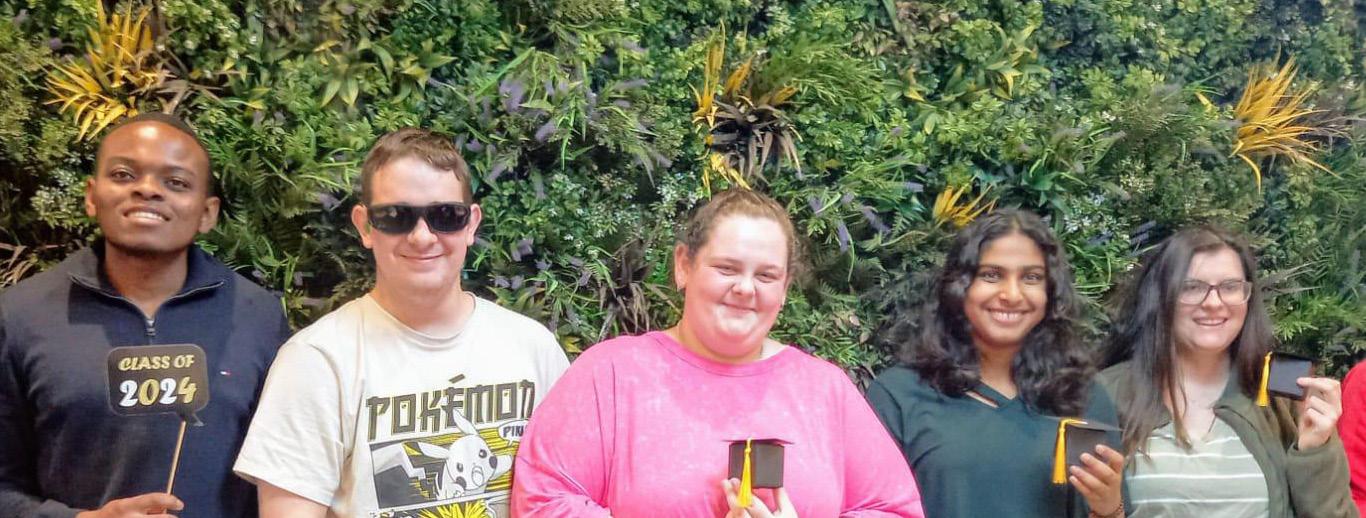
Over
4,300
The voice of children and young people is pivotal to our work and central to the impact we make. Through our RCPCH &Us programme, their insight, experiences and advocacy truly make RCPCH a force to be reckoned with. In 2024, over 4,300 children, young people, family members and health professionals volunteered over 3,000 hours of their time with the Children and Young People’s Engagement team.
185 sessions took place online or in person with children, young people and/or family members to support projects on creative arts, long term conditions, campaigning and lobbying, supporting governance, creating content, developing skills and more. The team visited over 35 locations in all four UK nations to deliver inperson sessions, engagement or projects. We’re incredibly proud of everyone who made this such a positive year, and want to thank each and every child and young person who makes RCPCH the powerful organisation it is.
Across 2024, we ran our first ever leadership programme for young people. Eleven young people and young adults took part in the programme, run by RCPCH &Us, in which they received nine months of training and coaching, carried out research and ran pilot projects to test their skills. The participants worked together in person and online, looking at paediatric training and assessments, engagement standards, mental health and digital transformation, developing skills in critical thinking, influence, leadership, conflict resolution and more. We held our graduation in September 2024 and look forward to seeing how our young leaders progress within RCPCH.
This year saw the launch of our new course, with a cohort of members and allied health professionals in Stirling, Scotland taking part in the “Recipes for Engagement” training. The course was developed in quality improvement collaboratives, and as a standalone course looks at children’s rights, engagement planning, safer working practices, practical tips and tools for engagement and how to work with children and young people’s voice as a data set.
children, young people, family members and health professionals volunteered
185 sessions took place online or in person with children, young people and/ or family members to support projects on creative arts, long term conditions, campaigning and lobbying, supporting governance, creating content, developing skills and more”
We had great feedback from the first attendees, and are planning to run the course regularly in the future around the UK.
Over 1,000 health professionals were supported through our Engagement Academy in 2024, with training, coaching, and information, advice and guidance sessions. Participants of the Engagement Academy grow skills, confidence and expertise in engaging with children and young people. The Academy provides information and guidance sessions to support understanding of why children and young people’s voice matters, how to make a difference with effective engagement planning and what is needed to be successful through best practice models and a rights-based approach to engagement. It is proving to be a growing success, and College members, researchers, and organisations value the expertise, the opportunity to explore challenges and the range of resources available to them.
In summer 2024, we launched an inclusive and accessible recruitment campaign for a second Youth Trustee, bringing in the highest number of trustee candidates to date. We were delighted to announce Iman Osman as our new Trustee, who joined us in October 2024 and works alongside fellow Youth Trustee, Taona Makunganya.
In September 2024, the Epilepsy12 Youth Advocates presented at the seventh annual Epilepsy12 & OPEN UK National Conference in Leeds. Established in 2018, this is a group of epilepsy experienced or interested children, young people and families, bringing their voices and experiences to the forefront through youth-led project work and advocacy. They explored the topic of building independence skills and transition through epilepsy care, exploring how children and young people can be in more control of their future with the support of healthcare professionals. Alumni Youth Advocates Rachael and Owen discussed role modelling and listening to and acting on children and young people’s voice, and Dr Colin Dunkley received the Epilepsy12 Youth Voice Legacy award for his unstoppable ability to hear and act on Epilepsy12 Youth Advocate voices within the audit.
A new Diabetes Communications Project is underway, with over 40 children and young people volunteering to take part. The project is designed to raise awareness of the NPDA audit, looking at principles of how to communicate effectively with children and young people.
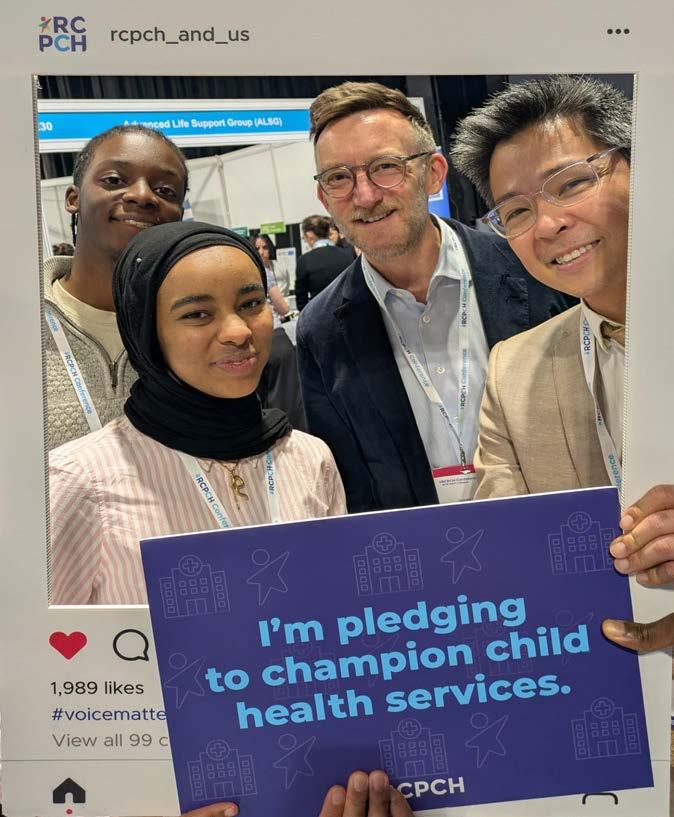
One of our key projects early in the 2024 calendar year was undertaking a significant member survey, in which over 3,000 members participated. The survey was designed to help us better understand our members, including the challenges they face and their ambitions, and to gather feedback on how they view the College and how we can best support them moving forward. We used the findings to inform our work throughout 2024.
Overall, members were hugely positive about RCPCH, with the majority of respondents rating us ‘Excellent’ or ‘Good’. When it comes to future aspirations for the College, members want us to support education, online learning, and CPD, as well as advocating for child health and the paediatric workforce and setting standards of care in children’s health services to support quality improvement.
In 2024, the Children and Young People’s Engagement team joined NHS ConfedExpo 2024 with a vibrant stand with a clear message. As the only Medical Royal College there, and the only organisation primarily working on child health, it was a critical platform to discuss impact and raise awareness of children and young people’s rights, and how to engage services and systems so they understand what matters to children and young people. We talked to over 240 NHS systems leaders and decision-makers during the Expo and got fantastic feedback from college members. Every RCPCH member who visited our stand shared overwhelmingly positive feedback on being part of a powerful voice (and stand) for child health advocacy.
To celebrate this day in 2024, 35 RCPCH staff gave their time and expertise as part of an event to promote and advocate for children’s rights. The multi-platform event made significant impact around awareness and understanding of the rightsbased approach, and how to act as duty bearers of children’s rights. RCPCH &Us volunteers created videos, shared a game that staff took part in, supported staff to create a rights collage, and had conversations about the United Nation Convention on the Rights of the Child. The event created a very positive buzz, with many attendees finding both the content and format a powerful way to celebrate World Children’s Day.
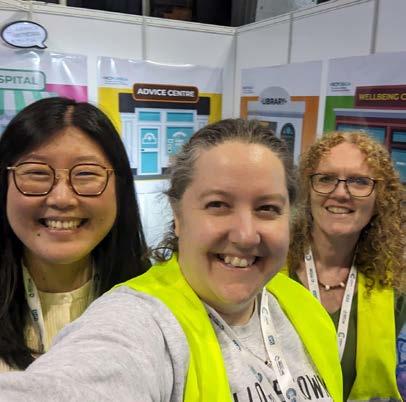
We have continually engaged with our members to provide them with support in their careers. We responded to what members told us they want and need from us through the member survey conducted early in the year.
Through 2024, we were proud to support thousands of members through their exams, helping them provide excellent health care for children and young people.
In 2024:
3,055
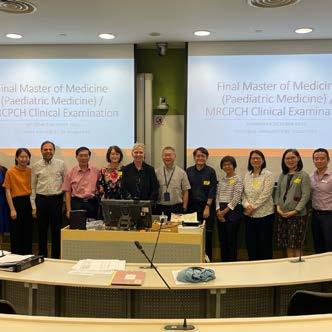
candidates took the Foundation of Practice theory exam, which is for both MRCPCH (membership) and the Diploma of Child Health
2,803
candidates took the Theory and Science theory exam
35
RCPCH staff gave their time and expertise as part of an event to promote and advocate for children’s rights
2,424
candidates took the Applied Knowledge in Paediatrics exam
2,064
candidates took the MRCPCH Clinical exam
164
candidates took the DCH Clinical exam
Learning never stops. As the College for paediatricians, we’re proud to be by the side of members from pre-med to retirement and wherever their career takes them. An impressive 3,323 delegates joined one or more of our courses in 2024, boosting their career progression and keeping them informed with the latest research, evidence and practice in child health. With an average rating of 4.5 out of 5 for all RCPCH courses, we know our members are able to increase their impact through our services.
Launched in 2024, the Thrive Paediatrics Resource Hub is our latest way of improving the wellbeing and working lives of paediatricians. Supported by the Dinwoodie Charitable Company and hosted on our RCPCH Learning platform, the Thrive Hub offers a range of evidencebased resources, from articles and books to videos and podcasts, covering topics including compassionate leadership, psychological safety and burnout.
The Thrive Hub also presents a range of resources to support writing business cases and developing projects to improve the working lives of paediatricians. Paediatricians across the Thrive Paediatrics community share work, projects and initiatives they are already doing to improve the wellbeing and working lives of their colleagues, offering ideas and inspiration for what members can try in their local teams or departments when faced with a similar challenge. These are mapped to our Roadmap for Transforming Working Lives, which we published in 2023.
We’re really pleased to see how members are integrating Thrive into their professional lives, with over 18,000 users getting involved so far. We know, by fostering a supportive community and providing practical tools, The Thrive Hub has already started to empower paediatricians to navigate challenges, enhance workplace culture and enjoy sustainable, fulfilling careers in paediatrics.
Despite our best efforts to protect and promote wellbeing, many of us will still experience challenges at some point in our careers. Navigating these difficulties can leave us questioning our careers in paediatrics or even our identity as doctors. Several paediatricians have generously shared their journeys on the hub to highlight that nobody is alone and that, with the right support, we can indeed find a way to thrive again.”
Jess Morgan, Dinwoodie RCPCH Fellow 2024

18,000 users getting involved so far
…nine episodes have been downloaded almost
6,000 times

Our educational podcast show continues to go from strength to strength. Listeners can find real-world advice and guidance on how to manage a range of clinical topics, views and opinions on education, training and working in paediatrics.
Covering topics from fever to family health information, social media to Strep A, the podcast’s nine episodes have been downloaded almost 6,000 times. We are really pleased our content is helping inform and entertain medical professionals, and help get quality, authoritative and trustworthy information to more listeners.
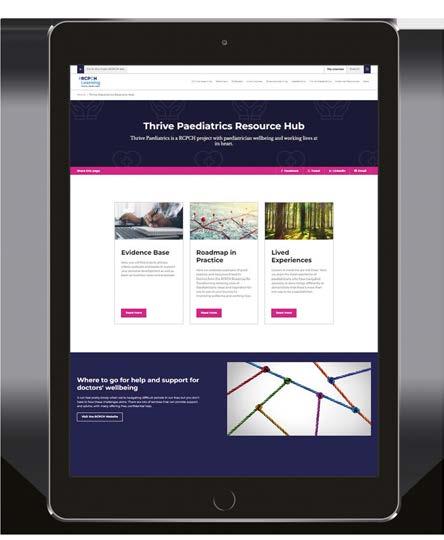
August 2024 marked the one year anniversary of the launch of Progress+, our paediatric training programme. This was an opportunity to reflect on the transition process from the previous curriculum, Progress, and look to the future. Progress+ brought significant change to doctors in training, trainers and systems alike. The journey had been challenging, but the training structure of seven years, two levels and more flexibility has now been embedded.
When we were designing the Progress+ curriculum, we envisaged what ‘really good’ training would look like. This was structured around 11 training principles, which anchor training in meaningful philosophies that provide an overarching view of what training should be. The Paediatrician of the Future document, which had been published in 2020, gave a guide to these principles and practical tips on how they can be implemented within local training programmes. Postgraduate doctors in training also produced resources on what each training principle means in practice, shared on our website.
Progress+ acknowledges and celebrates that many doctors-in-training take time out of the programme to gain additional skills that still contribute to their development as well-rounded and excellent consultant paediatricians and people. One of the key aims of Progress+ is to promote flexibility. Lives are complex and training is hard, so there is no doubt that flexibility is a big help. Progress+ has an increased emphasis on capability-based training – the idea that doctors in training accrue curriculum evidence at different rates and progression should not be based on time alone. Change is all about short-term pain for long-term gain. One year and much frustration later, we can look forward to reaping the rewards of a curriculum that celebrates the whole lives of our doctors-in-training, young people and families”
Joshua Hodgson, Postgraduate Doctor in Training Representative 2024

Right now, in England, a parent can use the defence of ‘reasonable punishment’ to justify hitting a child (Section 58, Children Act 2004). In Northern Ireland the ‘reasonable punishment’ defence (Article 2, Law Reform (Miscellaneous Provisions) (Northern Ireland) Order 2006) lets the same barbarity continue.
Children are the only group of people not fully protected in law from physical assault. This means that if a parent physically assaults their child, they may be able to argue it was ‘reasonable punishment’ or ‘chastisement’.
In early 2024, we carried out an evidence review of the impacts of physical punishment (corporal punishment) on children and young people, finding its use has a negative impact on children’s physical and mental health, as well as their social, emotional and behavioural outcomes. It couldn’t be clearer that steps must be taken to reduce the use of physical punishment of children.
Our paediatrician members had told us about the challenges to support families away from physical punishment when the legislation did not proscribe physical abuse of any kind.
We continued an exciting partnership with Vertex for the ‘Vertex Physicians in Pharma Programme’. This is a unique, one-year work placement for exceptional physicians in training to enrich their curriculum and knowledge by understanding and experiencing pharmaceutical medicine.

In April 2024 we published our key recommendations to the government on the practicalities of removing the 'reasonable punishment defence’ from law and what they needed to do to reduce the use of physical assaults. Our full report set out the case for following the lead of Scotland and Wales and changing the law in England and Northern Ireland in order to serve as a catalyst for ending the use of physical punishment across the United Kingdom.
Political leaders in England and Northern Ireland now have an opportunity to follow their counterparts in Scotland and Wales and commit to protect children from harm. We continue to work closely with MPs, Peers, MLAs and wider stakeholders across both countries to get the legislation updated in line with the rest of the UK and over 60 countries around the world.
During 2024, we published new, comprehensive guidance for best practice in several areas. This included reports on Medication safety: Best practice for effective paediatric ward rounds – clinical practice guideline. We published the revised 2024 Screening for Retinopathy of Prematurity (ROP) guideline following a rapid review. The screening criteria recommendations from the 2022 guideline update were revisited in light of new evidence published in April 2024.
We also updated the criteria for the diagnosis of death by neurological criteria in infants, children and adolescents, which would be presented in the Academy of Medical Royal Colleges Code of Practice in early 2025.
The British Paediatric Surveillance Unit (BPSU), of which RCPCH is a partner organisation, published new research findings, improving understanding and knowledge of childhood conditions. These covered chronic recurrent multifocal osteomyelitis/ chronic nonbacterial osteomyelitis (CRMO/CNO), Pierre Robin Sequence (PRS), neonatal COVID-19, avoidant/ restrictive food intake disorder (ARFID), severe chronic fatigue/myalgic encephalomyelitis, and haemolytic uraemic syndrome.
We launched a clinical guideline hub, which provides paediatric specialty groups and members with essential information and resources to develop their own guidelines. We aim to further disseminate the hub through participatory learning events.
We are delighted to have been awarded an RCPCH NIHR Programme Development Grant to support our research. This work, delivered by a multidisciplinary team including children and young people themselves, aims to improve outcomes for children seeking asylum in the UK. We hope the project will have a significant and meaningful impact on outcomes and experiences for this vulnerable group of young people.”
Dr Sarah Eisen, Principal Investigator, University College London Hospitals NHS Foundation Trust
The Get It Right First Time’s (GIRFT) Paediatric Further Faster (FF) programme aims to address wait times by sharing good practice and providing guidance for primary and secondary care practitioners. This year, we were proud to contribute guidance, previously developed for Paediatric Care Online, for their first 10 priority areas. The guidance has received positive reactions with over 1,900 downloads.
The College also launched and completed the fourth wave of the Epilepsy Quality Improvement Programme (EQIP), thanks to funding from NHS England. We also secured funding to develop online learning on familial hypercholesterolaemia. And thanks to the generosity of the Dinwoodie Charity, we recruited Dinwoodie-RCPCH Clinical Fellows, who developed the new Thrive Hub, a growing pool of resources to support individuals, teams, organisations and regions involved in paediatrics to improve their working lives.
In 2024, we partnered with NIHR to support the launch of the Programme Development Grant, dedicated to child health and wellbeing research. The grant scheme funded £1.5 million of child health and wellbeing research and paves the way for further opportunities. The funded projects will strengthen research capacity, capability and sustainability in some of the most complex and challenging areas of paediatrics.
The National Paediatric Advisor for GIRFT, Dr Ronny Cheung said,” It has been great to have the support and expertise of the RCPCH in creating these advice and guidance templates to enhance clinical conversations between GPs and paediatricians. It is critical that the professional body representing child health is involved in designing such a key intervention which aims to support care for children and young people to be delivered in primary care where appropriate, and to drive higher quality referrals to hospital for children and young people who need that – all while reducing variation in clinical practice. And in an environment where paediatricians are asked to deliver more for less, this resource will save paediatricians a lot of time by standardising a high quality response to requests for clinical advice on these commonest indications for referral”.
Our vision is:
Our mission is to:
Advance child health practice, shape policy, set educational standards and empower paediatricians. We are led by insights from our members, children and young people.
The Board of Trustees is responsible for governing and assuring the College's activities to ensure it fulfills its purposes for public benefit. So overseeing how the College creates impact is an important aspect of what we do.
2024 was an important year for the College, as it reflected on its charitable objectives and considered where it can have the most impact for the paediatric workforce and children. Our role as a Board of Trustees is to support the College to promote high quality, effective and efficient health services for children and young people, delivered by appropriately trained and experienced doctors. I hope that the wide-ranging stories you’ve read in the review provide you with a colourful picture of the College’s work and reach.
Partnership is a key component to continued future success, and I hope that you are inspired by what has been achieved.”
The College’s latest membership survey came at a good time and was extremely insightful in helping us plan for the short, medium and long term. I look forward to future impact reviews continuing to tell the story of how the College is delivering ambitions in the new strategy. Partnership is a key component to continued future success, and I hope that you are inspired by what has been achieved.
1
The size, skill and welfare of the UK child health workforce are prioritised by senior NHS decision makers to meet the needs of children and young people across the four nations.
Child health is at the centre of decisionmaking across the four nations.
Research, evidence and clinical standards improve safety and child health outcomes.
RCPCH has an international impact in paediatrics and child health.

Joanne Shaw, Chair of the Board of Trustees
Royal College of Paediatrics and Child Health
Incorporated by Royal Charter and registered as a Charity in England and Wales: 1057744 and in Scotland: SCO38299.
Registered Office 5-11 Theobalds Road, London WC1X 8SH. Patron HRH The Princess Royal.
© 2025 Royal College of Paediatrics and Child Health.